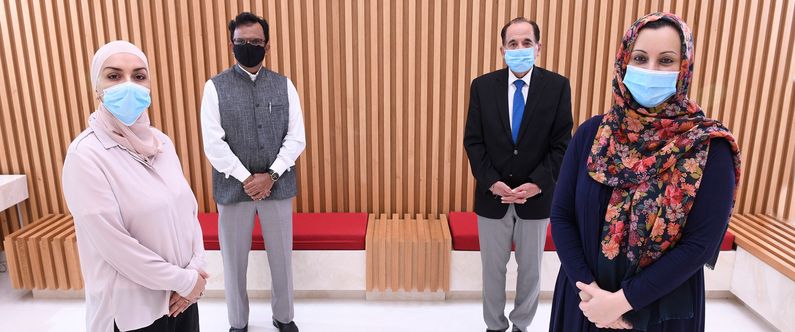WCM-Q research probes effects of school closures on child health
 From left: Drs. Karima Chaabna, Sathya Doraiswamy, Ravinder Mamtani, and Sohaila Cheema of the Institute for Population Health at WCM-Q.
From left: Drs. Karima Chaabna, Sathya Doraiswamy, Ravinder Mamtani, and Sohaila Cheema of the Institute for Population Health at WCM-Q.
Researchers from the Institute of Population Health (IPH) at Weill Cornell Medicine-Qatar (WCM-Q) have investigated the impact of COVID-19 school closures on the mental and physical health of children and adolescents.
The researchers found that school closures and home quarantine were associated with increased stress, sadness, frustration, indiscipline, loneliness, disrupted sleep patterns, hyperactivity among the young, and a breakdown of daily routines. Additionally, researchers observed a significant decrease of 45 percent in hospital admissions and of 68 percent in pediatric emergency department visits for common ailments like gastroenteritis, respiratory infections and ear ailments (infections).
The study, titled ‘The Impact of COVID-19 School Closure on Child and Adolescent Health: A Rapid Systematic Review,’ also noted a reduction in daily physical activity, increased risk of childhood obesity and higher body-mass index (BMI) scores. The study was a rapid systematic review that analyzed data from ten studies on child and adolescent health conducted in the USA, Japan, France, Italy, Thailand, and Turkey. The study has been published in Children, a leading journal.
Another key study finding was the loss of access for students to the usual critical services provided by schools. These included school-based healthcare services, programs for children with disabilities, and school and childcare-based nutritional programs aimed at underprivileged children. The study also identified a greater risk of widening educational disparities caused by parents from poorer households, who have less time and resources to facilitate remote learning during school closures. While sleep patterns were found to be altered, sleep quality of children and young people did not appear to be negatively affected by school closure. Suicide rates among children and adolescents were not affected. The authors of the research are Dr. Ravinder Mamtani, Vice Dean for Student Affairs-Admissions, Population Health, and Lifestyle Medicine; Dr. Sohaila Cheema, Assistant Dean for the IPH; Dr. Sathya Doraiswamy, Assistant Director of the IPH; Dr. Karima Chaabna, Instructor in Population Health Sciences with the IPH, and Dr. Sonia Chaabane.
The study concluded that further research is needed to assess the impact on health, social development and the ability of children and adolescents to learn during pandemic-related school closures. In particular, the authors recommended investigation of key quality of life indicators, such as lifestyle habits, cognitive development, social interactions (including social media use), screen time, and time spent studying. The authors also suggested for public health authorities to devise customized benefit and risk assessment studies, taking into account the local socio-economic context, the school system, and the availability of healthcare resources.
The research can be read in full here: https://www.mdpi.com/2227-9067/8/5/415/htm